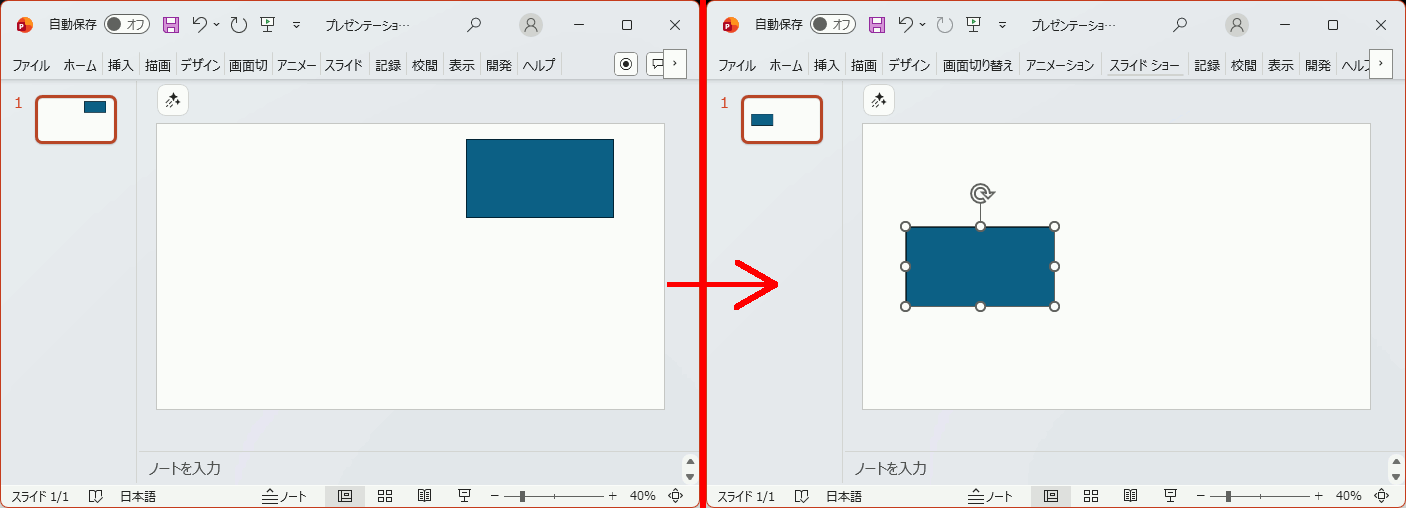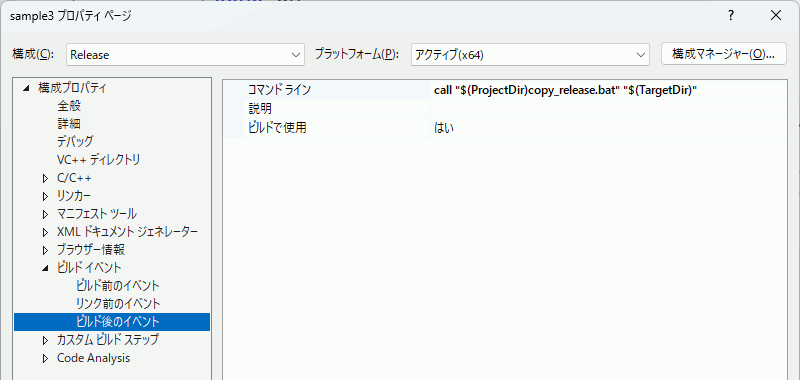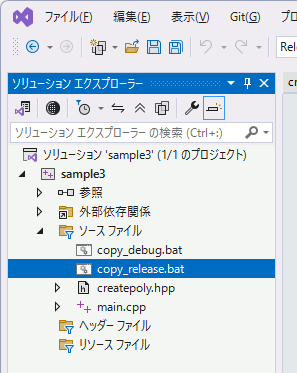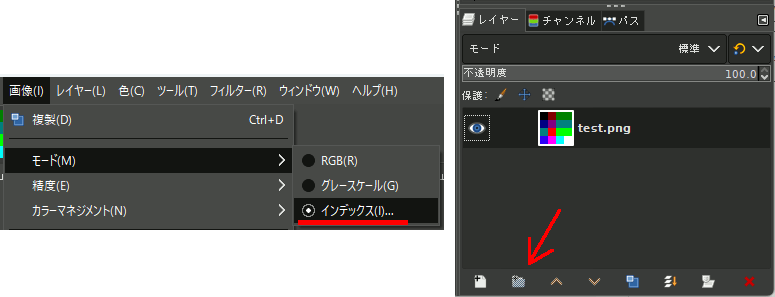PowerPointのマクロで選択したオブジェクトの位置を設定する
PowerPointではVBAマクロを使えるが、記録機能がないため、全部自分で書かないといけない。
'======================================= ' オブジェクトの位置とサイズを設定する関数(エントリポイント) '======================================= Sub SetObjectSizePosition() ' ピクセルを cm に変換するための値 Dim pt As Double pt = 28.3464567 ' 設定 ' 現状維持したい項目は Null に設定 SetSelectedObjectSize 9.86 * pt, Null SetSelectedObjectPosition 9.86 * pt , 6.91 * pt End Sub '======================================= ' オブジェクトのサイズを設定する関数 '======================================= Sub SetSelectedObjectSize(ByVal w As Variant, ByVal h As Variant) Dim shp As Shape If ActiveWindow.Selection.Type = ppSelectionShapes Then Set shp = ActiveWindow.Selection.ShapeRange(1) If IsNull(w) = False Then shp.Width = CDbl(w) End If If IsNull(h) = False Then shp.Height = CDbl(h) End If Else MsgBox "オブジェクトが選択されていません。" End If End Sub '======================================= ' オブジェクトの位置を設定する関数 '======================================= Sub SetSelectedObjectPosition(ByVal x As Variant, ByVal y As Variant) Dim shp As Shape If ActiveWindow.Selection.Type = ppSelectionShapes Then Set shp = ActiveWindow.Selection.ShapeRange(1) If IsNull(x) = False Then shp.Left = CDbl(x) End If If IsNull(y) = False Then shp.Top = CDbl(y) End If Else MsgBox "オブジェクトが選択されていません。" End If End Sub

VC++のビルドイベントに.batを設定
ビルド後、DLLをReleaseディレクトリにコピーしたい。わけあって環境変数は変えたくない。
以下のような copy_release.batを作成して、.vcxproj ファイルと同じ場所に置く。これは後で$(ProjectDir)copy_release.batとして指定するため。
コピー先のTARGET_DIRは第一引数で指定し、VC++プロジェクト側からは $(TargetDir) で指定する。
@echo on setlocal set "TARGET_DIR=%~1" copy "D:\libraries\VTK-9.5.1\shared-mfcunicode-release\bin\*.dll" "%TARGET_DIR%" copy "D:\libraries\wxWidgets-3.3.1\bin\vc_x64_dll\*.dll" "%TARGET_DIR%"
構成プロパティ → ビルド イベント → ビルド後のイベントで、$(ProjectDir)copy_release.batを$(TargetDir)引数で呼び出す

テンプレートのエクスポート
テンプレートとしてエクスポートする場合、バッチファイルをプロジェクトに登録しておく必要がある。

ImageMagickでRGBカラーのpngを出力
ImageMagickで変換して作成した.pngを読み込んだときGimpのレイヤーグループが作れなかった。
どうやらインデクスカラーの画像を扱うときはレイヤーグループを使えないらしい。

問題はなぜインデクスカラーになっているのかという点で、どうやらimagemagickはpngに変換するとき、色数を見て効率の良さそうな方を自動で選ぶらしい。
RGBカラーを指定するには、以下のように -define を使用する。
RGBAにしたい場合は以下。
magick convert sample16.ppm -alpha on -define png:color-type=6 testRGBA.png
tsl::robin_mapとstd::unordered_mapを比較
C++のstd::unordered_mapと同じように使えるtsl::robin_map。
std::unordered_mapと比較してみた。VC++2022でInsertとFindの時間を計ってみたが、何度かやると順位が入れ替わったりするのであまり大きな差はなさそう。
https://github.com/Tessil/robin-map
#include <iostream> #include <vector> #include <string> #include <algorithm> #include <random> #include <chrono> #include <tsl/robin_map.h> /* using KeyT = int; using ValueT = std::string; KeyT MakeKey(int i) { return i; } ValueT MakeValue(int i) { return "Value_" + std::to_string(i); } */ using KeyT = std::string; using ValueT = int; KeyT MakeKey(int i) { return "Value_" + std::to_string(i); } ValueT MakeValue(int i) { return i; }
std::vector< std::pair<KeyT, ValueT> > CreateData(int count) { std::vector< std::pair<KeyT, ValueT> > data; data.reserve(count); for (int i = 0; i < count; ++i) { data.emplace_back(MakeKey(i), MakeValue(i)); } return data; }
template<typename HashMap> void InsertTest(HashMap& mymap,const std::vector< std::pair<KeyT, ValueT> >& data) { for (size_t i = 0; i < data.size(); ++i) { mymap.insert({ data[i].first,data[i].second }); } }
template<typename HashMap> int FindTest(const HashMap& mymap, const std::vector< std::pair<KeyT, ValueT> >& data) { int results_count = 0; for (size_t i = 0; i < data.size(); ++i) { auto itr = mymap.find(data[i].first); if (itr != mymap.end()) { ++results_count; } } return results_count; }
struct test_times { std::chrono::microseconds insert_time; std::chrono::microseconds find_time; };
template<typename HashMap> test_times test( const std::vector< std::pair<KeyT, ValueT> > inserts, const std::vector< std::pair<KeyT, ValueT> > finds, HashMap& mymap) { test_times result; std::chrono::steady_clock::time_point start,end; /////////////////////////////////////////////////////////////// { // データを保存する時間の計測 start = std::chrono::high_resolution_clock::now(); mymap.reserve(inserts.size()); InsertTest(mymap, inserts); end = std::chrono::high_resolution_clock::now(); result.insert_time = std::chrono::duration_cast<std::chrono::microseconds>(end - start); } /////////////////////////////////////////////////////////////// { // データを検索する時間の計測 start = std::chrono::high_resolution_clock::now(); volatile int ret = FindTest(mymap, finds); end = std::chrono::high_resolution_clock::now(); result.find_time = std::chrono::duration_cast<std::chrono::microseconds>(end - start); } /////////////////////////////////////////////////////////////// return result; }
int main() { tsl::robin_map<KeyT, ValueT> mymap_robin; std::unordered_map<KeyT, ValueT> mymap_std; auto data = CreateData(100000); auto inserts = data; auto finds = data; int count = 100; int count_robin_insert = 0; int count_robin_find = 0; int count_std_insert = 0; int count_std_fine = 0; for (int i = 0; i < count; i++) { // データの並びを変える std::shuffle(inserts.begin(), inserts.end(), std::mt19937{ std::random_device{}() }); std::shuffle(finds.begin(), finds.end(), std::mt19937{ std::random_device{}() }); mymap_robin.clear(); mymap_robin.rehash(0); mymap_std.clear(); mymap_std.rehash(0); test_times robin = test(inserts, finds, mymap_robin); test_times stdmp = test(inserts, finds, mymap_std); count_robin_find += robin.find_time.count(); count_robin_insert += robin.insert_time.count(); count_std_insert += stdmp.insert_time.count(); count_std_fine += stdmp.find_time.count(); } std::cout << "robin insert time (ms): " << count_robin_insert / count << std::endl; std::cout << " std insert time (ms): " << count_std_insert / count << std::endl; std::cout << "------------------------" << std::endl; std::cout << "robin find time (ms): " << count_robin_find / count << std::endl; std::cout << " std find time (ms): " << count_std_fine / count << std::endl; return 0; }
KeyT == std::string , ValueT==int の場合
std insert time (ms): 9268
------------------------
robin find time (ms): 3542
std find time (ms): 4069
KeyT==int , ValueT == std::string の場合
std insert time (ms): 6708
------------------------
robin find time (ms): 858
std find time (ms): 1420
構造体のvectorから特定の要素を一列取り出す
構造体の配列から特定の要素だけをまとめた配列を作成する。
#include <vector> #include <string> struct test { int a; float b; std::string c; };
template <typename StructT, typename MemberT> std::vector<MemberT> column(const std::vector<StructT>& src, MemberT StructT::* member) { std::vector<MemberT> result; result.reserve(src.size()); for (const auto& v : src) { result.push_back(v.*member); } return result; }
int main() { std::vector<test> vec = { {1, 1.1f, "one"}, {2, 2.2f, "two"}, {3, 3.3f, "three"} }; std::vector<float> b_values = column(vec, &test::b); for (float b : b_values) { printf("%f\n", b); } return 0; }
2.200000
3.300000
メンバへのポインタを初めて使った。
Firefoxのアドレスバーに入力された文字列がURLに近いとき勝手にURLとして扱われる設定を解除
about:config → browser.urlbar.autoFill をfalseに設定する。

cmakeでビルドツリー作成時にファイルコピーを行う
特定のファイルなどがカレントディレクトリにないといけない場合、cmakeでファイル群をコピーできる。
cmake_minimum_required(VERSION 3.16)
# プロジェクト名と使用言語
project(MyApp LANGUAGES CXX)
# 実行ファイルを作成(出力名=MyApp、ソース=main.cpp)
add_executable(MyApp main.cpp)
# /MD
set(CMAKE_MSVC_RUNTIME_LIBRARY "MultiThreadedDLL$<$<CONFIG:Debug>:Debug>")
# DLLのディレクトリ
set(SRC_DIR D:/libraries/VTK-9.5.1/shared-mfcunicode-release/bin/)
## DLLのコピー
set(DST_DIR ${CMAKE_BINARY_DIR}/${CMAKE_BUILD_TYPE}/Release/)
file(COPY ${SRC_DIR} DESTINATION ${DST_DIR})
## DLLのコピー
set(DST_DIR ${CMAKE_BINARY_DIR}/${CMAKE_BUILD_TYPE}/Debug/)
file(COPY ${SRC_DIR} DESTINATION ${DST_DIR})
message("CMAKE_BINARY_DIR = ${DST_DIR}")
Pythonのctypesでwindowsのdll内の関数を呼び出す
C言語側 sample.dll
#include <windows.h> #include <cstdio> #if defined(_WIN32) #define DLL_EXPORT extern "C" __declspec(dllexport) #else #define DLL_EXPORT extern "C" #endif
DLL_EXPORT double squared(double* a) { return *a * *a; }
DLL_EXPORT void squared(double* a) { *a = *a * *a; }
DLL_EXPORT float add_values(int a, float b) { return a + b; }
DLL_EXPORT void get_version(char* const out_buf) { const char* text = "Version 1.0.0"; int len = strlen(text); if (out_buf != NULL) { strcpy(out_buf,text); } }
// 定数を返す DLL_EXPORT int get_constant_value() { return 42; }
// メッセージを標準出力に表示 DLL_EXPORT void print_message() { printf("Hello World\n"); }
BOOL APIENTRY DllMain( HMODULE hModule, DWORD ul_reason_for_call, LPVOID lpReserved ) { switch (ul_reason_for_call) { case DLL_PROCESS_ATTACH: case DLL_THREAD_ATTACH: case DLL_THREAD_DETACH: case DLL_PROCESS_DETACH: break; } return TRUE; }
Python側
import ctypes from ctypes import c_int, c_float,c_double, c_size_t, c_char_p, POINTER, create_string_buffer dll = ctypes.CDLL(r".\sample.dll") # # void squared(double* a) # dll.squared.argtypes = (ctypes.POINTER(c_double),) # 引数の型指定 dll.squared.restype = None # 戻り値の型指定 v = c_double(3.0) # Cの double 型の変数作成 dll.squared(ctypes.byref(v)) # 関数呼び出し , ポインタ渡し ret = v.value # 結果取得 print("squared result:", ret) # 結果表示 # # float add_values(int a, float b) # dll.add_values.argtypes = (c_int, c_float) # 引数の型指定 dll.add_values.restype = c_float # 戻り値の型指定 ret = dll.add_values(10, c_float(2.5)) print("add_values:", ret) # # void get_version(char* out_buf) # dll.get_version.argtypes = (ctypes.c_char_p,) # 引数の型指定 dll.get_version.restype = None # 戻り値の型指定 buf = create_string_buffer(64) # 文字列を受け取るためのバッファ作成 dll.get_version(buf) # 関数呼び出し , ポインタ渡し ret = buf.value.decode("utf-8") # 結果取得 print("version:", ret) # # int get_constant_value() # dll.get_constant_value.argtypes = () # 引数なし dll.get_constant_value.restype = c_int # 戻り値の型指定 ret = dll.get_constant_value() print("constant:", ret) # # void print_message() # dll.print_message.argtypes = () # 引数なし dll.print_message.restype = None # 戻り値なし dll.print_message() # 関数呼び出し
CMakeLists.txtで作成した.slnの出力先ディレクトリを変える
例えば以下のような CMakeLists.txtを用意し、
cmake_minimum_required(VERSION 3.16)
# プロジェクト名と使用言語
project(MyApp LANGUAGES CXX)
# C++標準(必要に応じて変更)
set(CMAKE_CXX_STANDARD 17)
set(CMAKE_CXX_STANDARD_REQUIRED ON)
set(CMAKE_CXX_EXTENSIONS OFF)
# 実行ファイルを作成(出力名=MyApp、ソース=main.cpp)
add_executable(MyApp main.cpp)
# /MD
set(CMAKE_MSVC_RUNTIME_LIBRARY "MultiThreadedDLL$<$<CONFIG:Debug>:Debug>")
以下でVC++のソリューションとプロジェクトを作成する。
と、プロジェクトの出力先が絶対パスになる。これの何が問題かというとディレクトリごとコピーしてプロジェクト複製したときに出力先が変わらない。

別に手で直せばいい。量もたいしたことは無いので、
とすれば良い。もし自動でやるなら、vcxprojファイルに書かれているので、xmlを編集する要領で書ける。
#include <iostream> #include <fstream> #include "pugixml.hpp" void fix_outdir(const char* path) { pugi::xml_document doc; if (!doc.load_file(path)) return; // 全 OutDir を対象に書き換え for (auto outdir : doc.select_nodes("//OutDir"))// //OutDir とすると、出現する全てのOutDirという意味になる { pugi::xml_node n = outdir.node(); n.text() = "$(SolutionDir)$(Platform)\\$(Configuration)\\"; } doc.save_file(path); } int main() { std::string vcxproj_path = R"(C:\myusertemp\test\build\MyApp.vcxproj)"; fix_outdir(vcxproj_path.c_str()); }
Windows 11 + wxWidgets 3.3.1 + VTK 9.5.1
VTK 9.5.1を使おうとしたところ、今までのwxWidgets+VTKのコードで動かなくなっていた。
なんとかWindows+wxWidgetsでVTK9.5.1での表示ができるようになった。

#include <wx/wxprec.h> #include <wx/glcanvas.h> #include <wx/frame.h> #ifndef WX_PRECOMP #include <wx/wx.h> #endif #include <GL/gl.h> #pragma comment(lib, "opengl32.lib") #include <iostream> //VTK_MODULE_INITに必要 #include <vtkAutoInit.h> #include <vtkOutputWindow.h> #include <vtkSmartPointer.h> #include <vtkRenderer.h> #include <vtkRenderWindow.h> #include <vtkRenderWindowInteractor.h> #include <vtkActor.h> #include <vtkPolyDataMapper.h> #include <vtkCylinderSource.h> #include <vtkInteractorStyleTrackballCamera.h> #include <vtkWin32OpenGLRenderWindow.h> #include <vtkWin32RenderWindowInteractor.h> #include <vtkConeSource.h> VTK_MODULE_INIT(vtkRenderingOpenGL2); VTK_MODULE_INIT(vtkInteractionStyle); vtkSmartPointer<vtkActor> CreateCone() { vtkSmartPointer<vtkConeSource> coneSource; coneSource = vtkSmartPointer<vtkConeSource>::New(); vtkSmartPointer<vtkPolyDataMapper> mapper; mapper = vtkSmartPointer<vtkPolyDataMapper>::New(); mapper->SetInputConnection(coneSource->GetOutputPort()); vtkSmartPointer<vtkActor> actor; actor = vtkSmartPointer<vtkActor>::New(); actor->SetMapper(mapper); return actor; } class MyGLCanvas : public wxGLCanvas { public: MyGLCanvas(wxFrame* parent,int* attribList = NULL); private: wxGLContext* m_context; // OpenGL context ////////////////////////////////////////// vtkNew<vtkWin32OpenGLRenderWindow> _renderWindow; vtkNew<vtkWin32RenderWindowInteractor> _interactor; vtkNew<vtkRenderer> _renderer; ////////////////////////////////////////// bool vtk_inited = false; ////////////////////////////////////////// // OpenGLコンテキストの作成をしてVTKに貸与する関数 void InitVTKFromCurrentContext(); ////////////////////////////////////////// // マウスイベントを処理 int last_x_ = 0, last_y_ = 0; void OnLeftDown(wxMouseEvent& e); void OnLeftUp(wxMouseEvent& e); void OnRightDown(wxMouseEvent& e); void OnRightUp(wxMouseEvent& e); void OnMiddleDown(wxMouseEvent& e); void OnMiddleUp(wxMouseEvent& e); void OnMotion(wxMouseEvent& e); void OnMouseWheel(wxMouseEvent& e); ////////////////////////////////////////// void OnPaint(wxPaintEvent& evt); }; MyGLCanvas::MyGLCanvas(wxFrame* parent, int* attribList) : wxGLCanvas(parent, wxID_ANY, attribList) { Bind(wxEVT_PAINT, &MyGLCanvas::OnPaint, this); m_context = new wxGLContext(this); SetBackgroundStyle(wxBG_STYLE_CUSTOM); Bind(wxEVT_LEFT_DOWN, &MyGLCanvas::OnLeftDown, this); Bind(wxEVT_LEFT_UP, &MyGLCanvas::OnLeftUp, this); Bind(wxEVT_RIGHT_DOWN, &MyGLCanvas::OnRightDown, this); Bind(wxEVT_RIGHT_UP, &MyGLCanvas::OnRightUp, this); Bind(wxEVT_MIDDLE_DOWN, &MyGLCanvas::OnMiddleDown, this); Bind(wxEVT_MIDDLE_UP, &MyGLCanvas::OnMiddleUp, this); Bind(wxEVT_MOTION, &MyGLCanvas::OnMotion, this); Bind(wxEVT_MOUSEWHEEL, &MyGLCanvas::OnMouseWheel, this); } void MyGLCanvas::OnLeftDown(wxMouseEvent& e) { SetFocus(); CaptureMouse(); last_x_ = e.GetX(); last_y_ = e.GetY(); _interactor->SetEventInformationFlipY(last_x_, last_y_, e.ControlDown(), e.ShiftDown()); _interactor->InvokeEvent(vtkCommand::LeftButtonPressEvent); } void MyGLCanvas::OnLeftUp(wxMouseEvent& e) { last_x_ = e.GetX(); last_y_ = e.GetY(); ReleaseMouse(); _interactor->SetEventInformationFlipY(last_x_, last_y_, e.ControlDown(), e.ShiftDown()); _interactor->InvokeEvent(vtkCommand::LeftButtonReleaseEvent); } void MyGLCanvas::OnRightDown(wxMouseEvent& e) { last_x_ = e.GetX(); last_y_ = e.GetY(); CaptureMouse(); _interactor->SetEventInformationFlipY(last_x_, last_y_, e.ControlDown(), e.ShiftDown()); _interactor->InvokeEvent(vtkCommand::RightButtonPressEvent); } void MyGLCanvas::OnRightUp(wxMouseEvent& e) { last_x_ = e.GetX(); last_y_ = e.GetY(); ReleaseMouse(); _interactor->SetEventInformationFlipY(last_x_, last_y_, e.ControlDown(), e.ShiftDown()); _interactor->InvokeEvent(vtkCommand::RightButtonReleaseEvent); } void MyGLCanvas::OnMiddleDown(wxMouseEvent& e) { last_x_ = e.GetX(); last_y_ = e.GetY(); CaptureMouse(); _interactor->SetEventInformationFlipY(last_x_, last_y_, e.ControlDown(), e.ShiftDown()); _interactor->InvokeEvent(vtkCommand::MiddleButtonPressEvent); } void MyGLCanvas::OnMiddleUp(wxMouseEvent& e) { last_x_ = e.GetX(); last_y_ = e.GetY(); ReleaseMouse(); _interactor->SetEventInformationFlipY(last_x_, last_y_, e.ControlDown(), e.ShiftDown()); _interactor->InvokeEvent(vtkCommand::MiddleButtonReleaseEvent); } void MyGLCanvas::OnMotion(wxMouseEvent& e) { last_x_ = e.GetX(); last_y_ = e.GetY(); _interactor->SetEventInformationFlipY(last_x_, last_y_, e.ControlDown(), e.ShiftDown()); _interactor->InvokeEvent(vtkCommand::MouseMoveEvent); } void MyGLCanvas::OnMouseWheel(wxMouseEvent& e) { last_x_ = e.GetX(); last_y_ = e.GetY(); _interactor->SetEventInformationFlipY(last_x_, last_y_, e.ControlDown(), e.ShiftDown()); if (e.GetWheelRotation() > 0) _interactor->InvokeEvent(vtkCommand::MouseWheelForwardEvent); else _interactor->InvokeEvent(vtkCommand::MouseWheelBackwardEvent); } void MyGLCanvas::InitVTKFromCurrentContext() { // wxのGLを現在化 wxPaintDC dc(this); SetCurrent(*m_context); // Win32ハンドル取得 HWND hwnd = this->GetHandle(); HDC hdc = dc.GetHDC(); HGLRC hrc = m_context->GetGLRC(); // wxWidgetsが作ったコンテキストをVTKへ貸与 _renderWindow->SetWindowId(hwnd); _renderWindow->SetDeviceContext(hdc); _renderWindow->SetContextId(hrc); _renderWindow->InitializeFromCurrentContext(); // レンダラの設定 _renderWindow->AddRenderer(_renderer); _interactor->SetRenderWindow(_renderWindow); _interactor->Initialize(); _interactor->Enable(); // マウスイベントを設定. auto style = vtkSmartPointer<vtkInteractorStyleTrackballCamera>::New(); style->SetDefaultRenderer(_renderer); _interactor->SetInteractorStyle(style); // レンダリング _renderer->SetBackground(1.1, 0.2, 0.3); _renderer->AddActor(CreateCone()); vtk_inited = true; } void MyGLCanvas::OnPaint(wxPaintEvent& evt) { if (!IsShown()) return; if (!vtk_inited) InitVTKFromCurrentContext(); SetCurrent(*m_context); _renderWindow->Render(); } class MyFrame : public wxFrame { public: MyFrame(const wxString& title, int xpos, int ypos, int width, int height); ~MyFrame(); void OnSize(wxSizeEvent& event); MyGLCanvas* m_canvas = NULL; }; MyFrame::MyFrame(const wxString& title, int xpos, int ypos, int width, int height) : wxFrame((wxFrame*)NULL, -1, title, wxPoint(xpos, ypos), wxSize(width, height)) { int args[] = { WX_GL_RGBA, WX_GL_DOUBLEBUFFER, WX_GL_DEPTH_SIZE, 16, 0 }; m_canvas = new MyGLCanvas(this, args); Bind(wxEVT_SIZE, &MyFrame::OnSize, this); } void MyFrame::OnSize(wxSizeEvent& event) { m_canvas->SetSize(event.GetSize()); } MyFrame::~MyFrame() { delete m_canvas; } class MyApp : public wxApp { public: bool OnInit(); }; bool MyApp::OnInit() { // VTKのデバッグ出力ウィンドウを表示しない vtkOutputWindow::SetGlobalWarningDisplay(0); MyFrame* frame = new MyFrame(wxT("wxWidgets OpenGL"), 50, 50, 400, 400); frame->Show(); return true; } IMPLEMENT_APP(MyApp)
追記
OnSizeを以下のように記述。
void MyGLCanvas::OnSize(wxSizeEvent& e) { if (!vtk_inited || !IsShownOnScreen()) return; int w = 0, h = 0; GetClientSize(&w, &h); // HiDPI 対応(MSW の例) int pw = w, ph = h; #ifdef __WXMSW__ double scale = GetContentScaleFactor(); pw = static_cast<int>(std::lround(w * scale)); ph = static_cast<int>(std::lround(h * scale)); #endif // 次のペイントで描画 Refresh(false); e.Skip(); // 既定処理も通す }